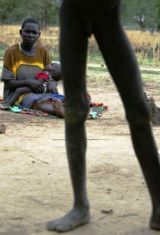Thousands flee southern Sudan for Uganda
KAMPALA, June 14 (Reuters) – More than 7,000 Sudanese refugees have crossed into northern Uganda in recent months fleeing hunger and rebel attacks, the United Nations refugee agency (UNHCR) said on Tuesday.

|
|
A Sudanese woman sits with her malnourished child at a feeding centre run by medical charity Medecins Sans Frontieres in the village of Paliang, roughly 160 km northwest of the southern town of Rumbek, May 25, 2005. (Reuters) . |
A peace deal in January ended more than two decades of war in southern Sudan but food shortages remain acute in many places and thousands of Sudanese have sought refuge in Uganda.
A UNHCR spokeswoman in the Ugandan capital Kampala said at least 7,682 refugees had entered Uganda since January, including more than 1,700 last month.
“The numbers are increasing. The main reasons they give for coming are food shortages and attacks by Ugandan rebels from the Lord’s Resistance Army (LRA),” Roberta Russo said.
The shadowy LRA has been fighting a separate 19-year-old war against Uganda’s government and has long terrorised remote communities on both sides of the mountainous border.
Russo said some new arrivals said they had been mistreated by the Sudan People’s Liberation Army (SPLA), the rebel force that fought Khartoum for control of the south during the war.
“Some of the refugees claim there is forced recruitment by the SPLA, and that there is some tribal tension due to the redistribution of power,” she said. “Most of them say they are afraid the peace agreement is not treating all tribes fairly.”
SPLA leader John Garang is an ethnic Dinka, and UNHCR said most of the new arrivals were from other southern tribes.
Uganda hosts about 220,000 Sudanese refugees, more than any other country bordering Sudan. Officials say despite the peace deal, shattered infrastructure across the border means assisted repatriations are not expected to begin until October.
Southern Sudan’s civil war, which killed more than two million people, broadly pitted the Islamist government in Khartoum against mainly Christian, animist rebels, and was complicated by issues of ethnicity, oil and ideology.
New UNHCR high commissioner, former Portuguese prime minister Antonio Guterres, will tour refugee camps in northern Uganda next week during his first trip to Africa in the role.
Guterres, 56, was appointed last month to replace former Dutch Prime Minister Ruud Lubbers.
